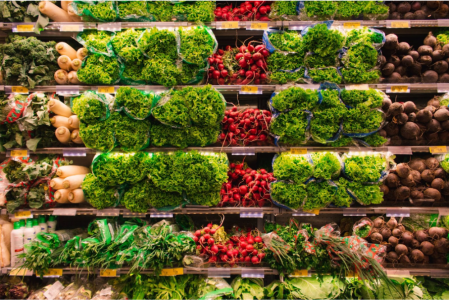Are Coles & Woolworths driving up your grocery costs? Discover the truth behind this supermarket giant duopoly
Have you noticed that your grocery bills have been soaring through the roof recently? You're not the only one. Many Australians are worried that their cost of living is increasing due to the skyrocketing prices of groceries.
Some experts claim that the root of the problem lies with the supermarket duopoly between Coles and Woolworths, the two giants that command nearly 70% of the market share in the country.
So are these supermarkets exploiting Australians while lining their pockets with huge profit margins? Let's examine the facts.

In recent reports, the cost of food at Coles and Woolworths had increased by 10.4% and 8.7, respectively, in April alone, with fresh food prices taking a significant 9.9% jump. During that time, investment bank UBS conducted research analysing over 60,000 supermarket products listed at both stores.
Former Australian Competition and Consumer Commission (ACCC) Chair Rod Sims has accused these supermarket titans of causing these price hikes due to a lack of competitiveness in the market. With a combined market share of nearly 70% (37.1% held by Woolworths Group and 27.9% by Coles Group), the two giants are seen as the main drivers behind the mounting cost of living pressures on Australian households.
In comparison, ALDI holds only 9.5% of the market share, IGA has 6.9%, and the remaining 18.6% is held by other retailers such as Costco, Amazon, and independent grocers.
Rod Sims suggested that the duopoly status of Coles and Woolworths allows them to increase their prices by more than necessary to cover their rising costs, ultimately resulting in customers paying more for their groceries.
During an inquiry, the current ACCC boss, Gina Cass-Gottlieb, also expressed her concerns regarding the 'level of concentration in the supermarket sector'. She acknowledged other factors driving higher prices but also stated that these issues could be 'competed away' in a more competitive market.
While Coles and Woolworths have reported a surge in profitability—11.6% and 14% increases, respectively—both supermarkets have attempted to counter accusations of price hiking. Coles attributed its margin expansion to reduced COVID-related costs and their Smarter Selling program, which focuses on loss prevention and supply chain efficiencies. Woolworths, on the other hand, cited higher wholesale prices they were paying to suppliers as a primary driver for grocery inflation.
Despite the explanations offered by the supermarket giants, critics continue to raise eyebrows, questioning the true intent behind these rising grocery prices. The Australia Institute's Director of the Centre for Future Work, Jim Stanford, has accused Coles and Woolworths of capitalising on the unique circumstances following the pandemic to 'fatten their profit margins'.
 While determining the exact extent of responsibility held by the supermarket duopoly in driving up grocery costs can be difficult, we can empower ourselves by making informed shopping choices and being mindful of our spending habits. Whether it's exploring more affordable alternatives, patronising independent grocers, or practising conscious consumption, every small action can make a difference.
While determining the exact extent of responsibility held by the supermarket duopoly in driving up grocery costs can be difficult, we can empower ourselves by making informed shopping choices and being mindful of our spending habits. Whether it's exploring more affordable alternatives, patronising independent grocers, or practising conscious consumption, every small action can make a difference.
Members, what strategies do you employ to save money on groceries and make your shopping more cost-effective? Share your tips and experiences below!
Some experts claim that the root of the problem lies with the supermarket duopoly between Coles and Woolworths, the two giants that command nearly 70% of the market share in the country.
So are these supermarkets exploiting Australians while lining their pockets with huge profit margins? Let's examine the facts.

The soaring prices of groceries have become a growing concern for many Australians as they grapple with the rising cost of living. Photo by Matheus Cenali.
In recent reports, the cost of food at Coles and Woolworths had increased by 10.4% and 8.7, respectively, in April alone, with fresh food prices taking a significant 9.9% jump. During that time, investment bank UBS conducted research analysing over 60,000 supermarket products listed at both stores.
Former Australian Competition and Consumer Commission (ACCC) Chair Rod Sims has accused these supermarket titans of causing these price hikes due to a lack of competitiveness in the market. With a combined market share of nearly 70% (37.1% held by Woolworths Group and 27.9% by Coles Group), the two giants are seen as the main drivers behind the mounting cost of living pressures on Australian households.
In comparison, ALDI holds only 9.5% of the market share, IGA has 6.9%, and the remaining 18.6% is held by other retailers such as Costco, Amazon, and independent grocers.
Rod Sims suggested that the duopoly status of Coles and Woolworths allows them to increase their prices by more than necessary to cover their rising costs, ultimately resulting in customers paying more for their groceries.
During an inquiry, the current ACCC boss, Gina Cass-Gottlieb, also expressed her concerns regarding the 'level of concentration in the supermarket sector'. She acknowledged other factors driving higher prices but also stated that these issues could be 'competed away' in a more competitive market.
While Coles and Woolworths have reported a surge in profitability—11.6% and 14% increases, respectively—both supermarkets have attempted to counter accusations of price hiking. Coles attributed its margin expansion to reduced COVID-related costs and their Smarter Selling program, which focuses on loss prevention and supply chain efficiencies. Woolworths, on the other hand, cited higher wholesale prices they were paying to suppliers as a primary driver for grocery inflation.
Despite the explanations offered by the supermarket giants, critics continue to raise eyebrows, questioning the true intent behind these rising grocery prices. The Australia Institute's Director of the Centre for Future Work, Jim Stanford, has accused Coles and Woolworths of capitalising on the unique circumstances following the pandemic to 'fatten their profit margins'.
Strategies To Save Money On Groceries
With rising grocery prices, finding ways to save money has become increasingly important. By adopting smart strategies, individuals can stretch their grocery budget without compromising on quality or nutrition. Here are five effective strategies to help you save money on your grocery shopping:- Plan Your Meals and Create a Shopping List:
- Before heading to the store, plan your meals for the week and create a detailed shopping list based on those meals.
- This helps you avoid impulse purchases and ensures that you only buy what you need, reducing wastage and saving money.
- Compare Prices and Shop Smart:
- Take the time to compare prices across different grocery stores or online platforms.
- Look for discounts, special offers, and bulk deals to maximise your savings.
- Consider purchasing store brands or generic alternatives, which are often cheaper and can be of comparable quality to branded products.
- Utilise Loyalty Programs:
- Keep an eye out for sales.
- Take advantage of loyalty programs offered by grocery stores, which often provide exclusive discounts, rewards, or cash-back offers.
- Buy in Season and Opt for Fresh Produce:
- Seasonal fruits and vegetables are usually more affordable due to their abundance.
- Opt for fresh produce instead of pre-cut or pre-packaged options, as they tend to be cheaper.
- Consider visiting local farmers' markets for potentially lower prices on fresh produce.
- Cook and Eat at Home:
- Cooking meals at home not only allows you to have more control over the ingredients and nutrition but also saves money.
Key Takeaways
- Greed and the grocery duopoly between Coles and Woolworths are important reasons why prices for groceries have increased in Australia.
- Former Australian Competition and Consumer Commission (ACCC) Chair Rod Sims blamed rising supermarket prices on a lack of competitiveness, citing the duopoly between Coles and Woolworths.
- Coles reported a $616m profit in February, indicating an increase of 11.6 per cent, and Woolworths group posted a $907m profit in the first half of the 2022/23 financial year, a 14 per cent year-on-year increase.
- Mr Sims advocates for more merger reform, preventing Coles and Woolworths from acquiring independent or smaller supermarkets.
Members, what strategies do you employ to save money on groceries and make your shopping more cost-effective? Share your tips and experiences below!







